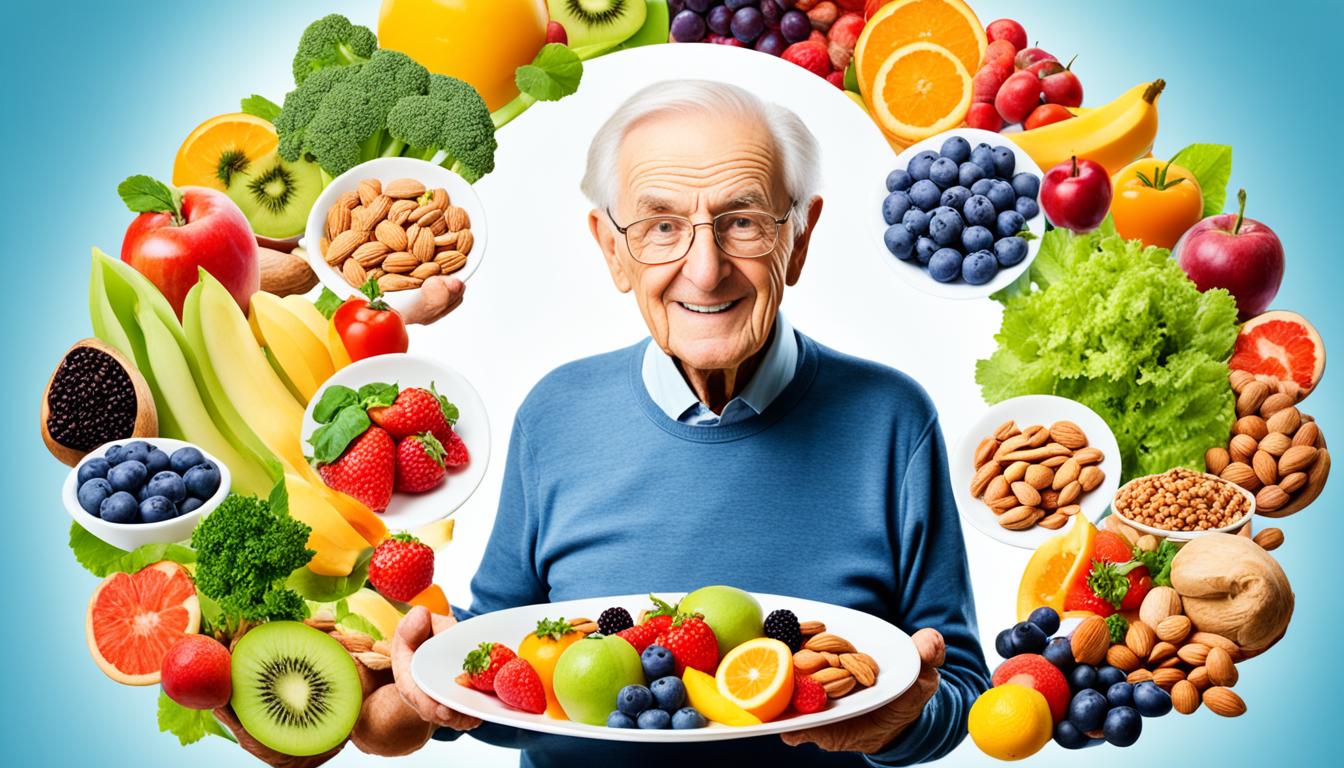Healthy Aging Nutrition Plans for Seniors. The 1 Best Guide
When I think about my grandparents, I’m filled with admiration for their resilience and the wisdom they’ve imparted to me over the years. Watching them navigate the ups and downs of life, I’ve come to realize the importance of taking care of oneself, especially as we age.
As our loved ones grow older, it becomes crucial to pay close attention to their well-being, with a particular focus on their nutrition. Providing seniors with healthy aging nutrition plans is an act of love and a way to honor their journey through life.
Through my own experiences and research, I’ve come to understand the significance of senior nutrition and the role it plays in promoting a vibrant and fulfilling life. And that’s why I’m excited to share this comprehensive guide on healthy aging nutrition plans for seniors.
Key Takeaways:
- Developing a healthy aging nutrition plan is vital for seniors’ overall well-being.
- Understanding the specific nutritional needs of seniors is crucial for effective planning.
- A balanced diet can promote vitality and wellness in later years.
- Meal planning and mindful eating play key roles in maintaining a healthy lifestyle.
- Addressing common challenges such as lack of appetite and dental issues is important for meeting nutritional needs.
Understanding the Importance of Senior Nutrition
Aging bodies have unique dietary requirements. It’s crucial to understand the importance of senior nutrition and how it contributes to overall health and well-being. As we age, our bodies undergo changes that affect our metabolism, nutrient absorption, and overall digestion. A healthy diet plays a vital role in maintaining optimal health and quality of life.
Elderly individuals face specific challenges when it comes to healthy eating. Factors such as decreased appetite, dental issues, and medication interactions can impact their ability to consume a well-rounded diet. To ensure seniors receive the necessary nutrients, meal planning becomes essential. By creating tailored meal plans that cater to their needs, we can ensure they stay nourished and promote their overall longevity.
Meal planning for the elderly involves considering their nutritional requirements, taste preferences, and any dietary restrictions they may have. Whether it’s balancing macronutrients, incorporating specific vitamins and minerals, or managing portion sizes, a well-designed meal plan can provide the necessary nourishment for healthy aging.
Challenges of Healthy Eating for the Elderly
The elderly often face various challenges when it comes to maintaining a healthy diet:
- Decreased Appetite: Loss of appetite is a common issue among seniors, which can lead to inadequate calorie and nutrient intake.
- Dental Issues: Dental problems, such as tooth loss or pain, can make it difficult for seniors to chew and enjoy certain foods.
- Medication Interactions: Certain medications can affect appetite or have specific dietary restrictions, making it challenging to follow a balanced diet.
- Loneliness and Isolation: Social factors, such as living alone or limited access to social interactions, can influence eating habits and motivation to cook nutritious meals.
Proper nutrition is the cornerstone of vitality and well-being in the golden years. By addressing the specific challenges faced by seniors, we can design meal plans that promote healthy eating and contribute to an overall better quality of life.
Elderly Meal Plans: Catering to Nutritional Needs
Designing meal plans for the elderly requires careful attention to their nutritional needs. Here are some key considerations when creating elderly meal plans:
- Individualized Approach: Each person has unique nutritional requirements based on factors such as age, gender, activity level, and any underlying health conditions.
- Balancing Macronutrients: Incorporating adequate amounts of protein, healthy fats, and carbohydrates helps meet energy needs and support overall health.
- Boosting Micronutrients: Seniors may have increased nutrient needs for certain vitamins and minerals, such as vitamin D, calcium, and B vitamins.
- Texture Modifications: Adjusting the texture of foods to accommodate dental issues can ensure seniors can enjoy a wide variety of nutritious options.
- Keeping Meals Flavorful: Using spices, herbs, and flavorful ingredients can enhance the taste and appeal of meals, encouraging greater consumption.
By implementing these strategies, we can create meal plans that are not only nutritionally balanced but also enjoyable for seniors.
| Key Nutrients for Healthy Aging | Food Sources |
|---|---|
| Protein | Lean meats, poultry, fish, legumes, nuts, and seeds |
| Fiber | Whole grains, fruits, vegetables, legumes, and nuts |
| Calcium and Vitamin D | Dairy products, fortified plant-based milk, leafy greens, and seafood |
| Vitamin B12 | Animal products, fortified cereals, and nutritional yeast |
| Omega-3 Fatty Acids | Fatty fish, flaxseeds, chia seeds, and walnuts |
As seen in the table above, including a variety of nutrient-rich foods can help meet the specific nutritional needs of seniors.
Understanding the importance of senior nutrition and designing appropriate meal plans can significantly impact the health and well-being of elderly individuals. By addressing their unique challenges and providing them with the necessary nutrients, we can support healthy aging and enhance their quality of life.
Key Nutritional Needs for Aging Adults
As we age, our bodies undergo certain changes that affect our nutritional needs. It becomes essential to prioritize a balanced diet for seniors to support healthy aging. Here, I will discuss the key nutrients that are particularly important for aging adults and provide valuable nutrition tips for seniors.
The Role of Protein
Protein plays a crucial role in supporting muscle health, immune function, and tissue repair. Aging adults require adequate protein intake to preserve muscle mass and strength. Including lean sources of protein, such as poultry, fish, beans, and tofu, in daily meals can satisfy these nutritional needs. Aim for about 20-30 grams of protein per meal to promote healthy aging.
The Importance of Fiber
Fiber is essential for digestive health, weight management, and preventing chronic conditions such as heart disease and diabetes. Aging adults should prioritize high-fiber foods like whole grains, fruits, vegetables, and legumes. These fiber-rich options add bulk to meals, promote bowel regularity, and contribute to overall well-being.
Vitamins and Minerals
Vitamins and minerals play a vital role in supporting various bodily functions and maintaining overall health. Aging adults should focus on incorporating nutrient-dense foods into their diet:
- Calcium and Vitamin D: These nutrients are crucial for maintaining bone health. Include dairy products, fortified plant-based milk, leafy greens, and seafood in your diet to meet your calcium and Vitamin D requirements.
- Vitamin C: This antioxidant vitamin helps boost the immune system and supports collagen production. Enjoy citrus fruits, berries, bell peppers, and leafy greens to ensure adequate Vitamin C intake.
- B Vitamins: B vitamins, including B12, are essential for energy production and cognitive function. Include fortified cereals, lean meats, fish, eggs, and dairy in your diet to meet your B vitamin needs.
By incorporating these key nutrients into daily meals, seniors can maintain optimal health, energy levels, and overall well-being. It’s important to consult with a healthcare professional or registered dietitian to ensure individual nutritional needs are met.
“A balanced diet for seniors is essential to support healthy aging. Prioritizing protein, fiber, vitamins, and minerals can help meet the unique nutritional requirements of aging adults.” – [Author Name]
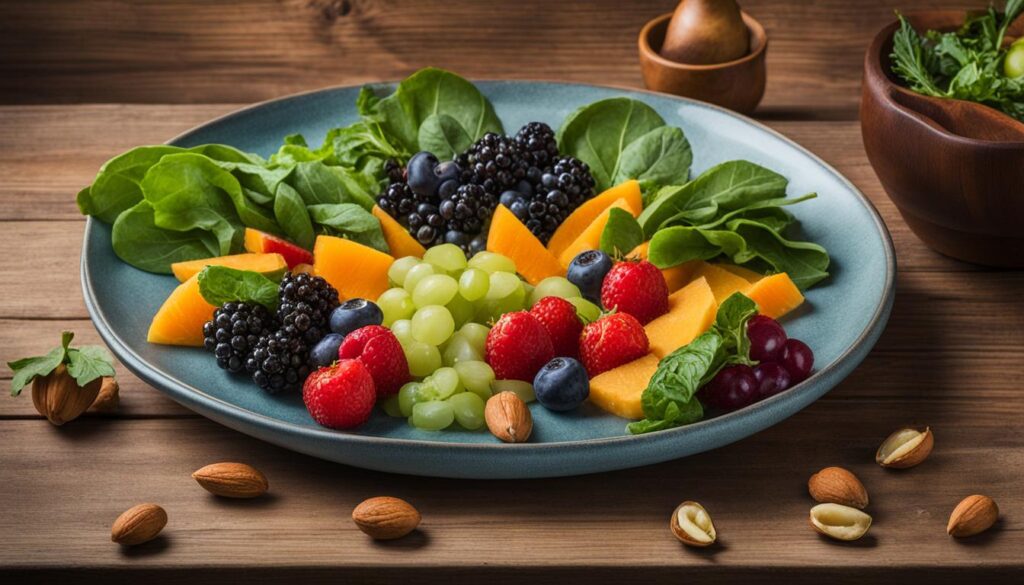
Designing a Well-Balanced Aging Nutrition Plan
Creating a well-balanced nutrition plan is essential for healthy aging. As we age, our bodies undergo changes that require specific attention to our dietary choices. In this section, I will guide you through the process of designing a nutrition plan that meets the specific needs of seniors, promoting their well-being and vitality.
The Importance of Portion Control
When it comes to designing an aging nutrition plan, portion control plays a crucial role. As metabolism slows down with age, it’s important to balance calorie intake to maintain a healthy weight.
“Portion control is the key to a balanced diet for healthy aging.”
To implement portion control effectively, consider using smaller plates and bowls to visually deceive your brain into feeling satisfied with smaller amounts of food. Additionally, listen to your body’s hunger and fullness cues, allowing yourself to feel nourished without overeating.
Incorporating Essential Food Groups
Meeting the dietary needs of seniors requires a focus on incorporating the essential food groups that provide the necessary nutrients for healthy aging. These food groups include:
- Whole grains: Opt for whole-wheat bread, brown rice, and oatmeal to ensure an adequate intake of fiber, vitamins, and minerals.
- Lean proteins: Include lean meats, poultry, fish, beans, and tofu in your meals to provide essential amino acids for muscle maintenance and repair.
- Fruits and vegetables: Aim for a variety of colorful fruits and vegetables to obtain antioxidants, vitamins, and minerals that support overall health.
- Dairy or dairy alternatives: Choose low-fat milk, yogurt, and cheeses to maintain bone health and ensure adequate calcium intake.
- Healthy fats: Incorporate sources of healthy fats, such as avocados, nuts, and olive oil, to support brain health and reduce the risk of chronic diseases.
By including these essential food groups in your nutrition plan, you can provide your body with the necessary nutrients for optimal functioning and healthy aging.
Consider Meal Timing
Meal timing is an important aspect of an aging nutrition plan. Spread your meals throughout the day to ensure a steady supply of energy and nutrients.
“Timely meals provide a regular source of energy and nutrients for healthy aging.”
Avoid skipping meals or prolonged periods without eating to prevent drops in blood sugar levels and promote satiety. Additionally, having a lighter dinner and avoiding heavy meals close to bedtime can aid digestion and provide a more restful sleep.
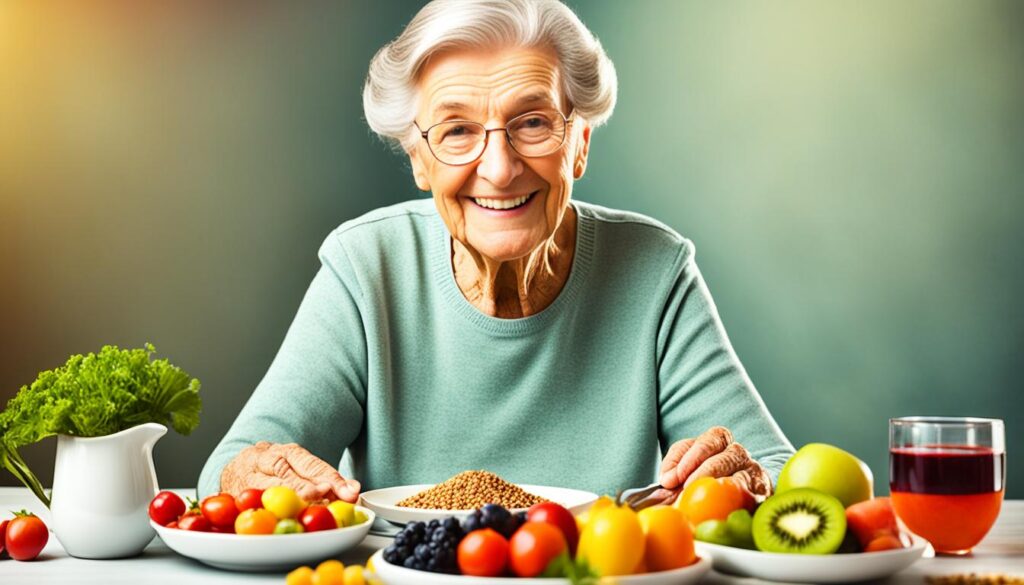
By focusing on portion control, incorporating essential food groups, and considering meal timing, you can design a well-balanced aging nutrition plan that promotes optimal nutrition and satisfaction. Remember to consult with a healthcare professional or registered dietitian for personalized guidance specific to your unique needs.
Meal Planning Tips and Tricks for Seniors
Creating and maintaining healthy eating habits can be made easier through effective meal planning. As we age, it becomes increasingly important to prioritize nutrition and make intentional choices that support our well-being. In this section, I will share valuable tips and tricks to help seniors create meal plans that are not only nourishing but also enjoyable and easy to follow.
1. Incorporate a Variety of Nutritious Foods
When developing meal plans for seniors, it’s essential to include a diverse range of nutritious foods to ensure they receive all the necessary nutrients. Aim to incorporate a variety of fruits, vegetables, whole grains, lean proteins, and healthy fats. By embracing different food groups, you can provide essential vitamins, minerals, antioxidants, and fiber that support overall health and well-being.
2. Emphasize Portion Control
Portion control is crucial, especially for seniors who may have different energy needs and metabolism compared to their younger counterparts. Encourage seniors to be mindful of portion sizes and balance their meals accordingly. Include appropriate serving sizes of protein, carbohydrates, and fats to maintain a balanced diet while avoiding overeating.
3. Plan Ahead and Meal Prep
Planning meals in advance and engaging in meal prep activities can save time, energy, and ensure seniors have healthy options readily available. Set aside time each week to plan meals, create a shopping list, and prepare ingredients or pre-cook meals whenever possible. This practice enables seniors to have nutritious meals at hand, reducing the temptation to opt for convenience foods that may be less healthy.
4. Focus on Convenience and Accessibility
When developing meal plans for seniors, consider their convenience and accessibility needs. Choose recipes that are easy to prepare, require minimal effort, and utilize familiar ingredients. Accessibility can be improved by incorporating a variety of textures and flavors to maintain interest in meals. Additionally, consider any specific dietary restrictions or preferences and adapt recipes accordingly, ensuring meals are both enjoyable and suitable for individual needs.
5. Engage in Smart Grocery Shopping
Smart grocery shopping is key to successful meal planning. Make a list before heading to the store, focusing on healthy staples and ingredients that align with the meal plan. Opt for fresh produce, lean proteins, whole grains, and low-sodium options whenever possible. Avoid aisles with processed and sugary snacks that may tempt seniors to deviate from their meal plan. By shopping intentionally, seniors can stock their kitchen with nutritious ingredients that support their dietary goals.

6. Simplify Cooking Techniques
Cooking techniques that are simple and require minimal effort can make meal preparation more enjoyable for seniors. Encourage the use of slow cookers, pressure cookers, and one-pot recipes that minimize time spent in the kitchen. These techniques not only simplify the cooking process but also allow for the creation of flavorful and nutritious meals with minimal effort.
Incorporating these meal planning tips and tricks into the daily routine of seniors can empower them to make healthier choices and ensure their nutritional needs are met. By creating meal plans that are diverse, balanced, and convenient, seniors can enjoy delicious and nourishing meals that contribute to their overall well-being.
Addressing Common Challenges in Senior Nutrition
Seniors often face unique challenges when it comes to maintaining a healthy diet. In this section, I will address some common obstacles that can hinder the nutritional needs of seniors and discuss strategies to overcome them. By understanding and proactively addressing these challenges, we can ensure that our loved ones receive the nutrition they need to thrive in their golden years.
1. Lack of Appetite
One of the most prevalent challenges seniors face is a decreased appetite. This can be due to various factors, including changes in taste buds, medications, and reduced physical activity. It’s essential to find ways to stimulate appetite and encourage regular eating.
To address this challenge:
- Offer smaller, more frequent meals: Rather than insisting on three large meals a day, consider offering several smaller meals and snacks throughout the day. This can help seniors consume enough calories and nutrients without feeling overwhelmed.
- Make meals visually appealing: Aesthetically pleasing presentation can stimulate appetite. Use colorful fruits and vegetables, and garnish dishes with fresh herbs to make them more visually enticing.
- Experiment with different flavors: Aging can affect taste buds, making food taste less flavorful. Encourage seniors to try new recipes, seasonings, and spices to enhance the taste of their meals.
2. Dental Issues
Another common challenge seniors face is dental issues, such as tooth loss or gum disease. These conditions can make chewing and swallowing difficult, limiting food choices and affecting nutrient intake.
To address this challenge:
- Choose softer food options: Opt for foods that are easier to chew and swallow, such as cooked vegetables, tender meats, and mashed potatoes. Incorporate smoothies or pureed soups to provide a variety of nutrients.
- Encourage proper dental care: Regular dental check-ups and appropriate denture care can help seniors maintain good oral health, allowing them to enjoy a wider range of foods comfortably.
3. Medication Interactions
Medications are a crucial aspect of senior health, but they can sometimes interfere with nutrition. Certain medications may affect appetite, nutrient absorption, or increase the risk of nutrient deficiencies.
To address this challenge:
- Consult with healthcare professionals: Discuss any potential medication-related nutrition concerns with healthcare providers. They can offer guidance on potential interactions and recommend adjustments to the diet or medications, if needed.
- Ensure a balanced diet: Focus on providing a well-balanced diet that includes a variety of nutrient-dense foods. If specific nutrients are affected by medication, work with healthcare professionals to find suitable alternatives or supplements.
“By understanding and addressing common challenges in senior nutrition, we can ensure that our loved ones receive the essential nutrition they need to maintain their health and well-being.”
Addressing these common challenges is crucial for promoting healthy eating habits among seniors. By understanding their unique obstacles and finding practical solutions, we can ensure that they receive the necessary nutrients to support their overall health and vitality.
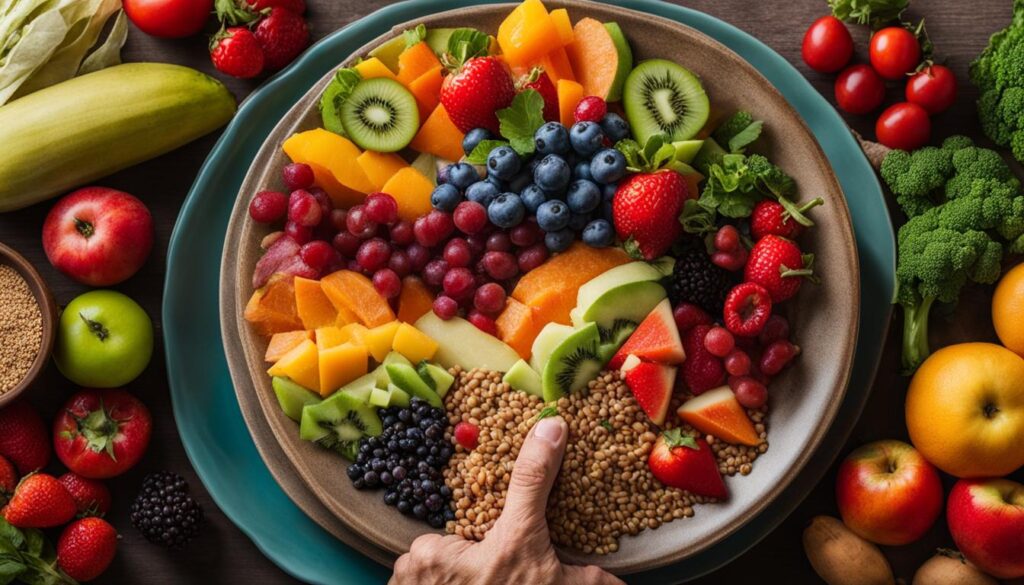
The Role of Hydration in Healthy Aging
Proper hydration plays a crucial role in maintaining optimal health as we age. As our bodies mature, it becomes even more important to prioritize adequate fluid intake to support overall well-being. Staying hydrated not only keeps us feeling refreshed but also contributes to various bodily functions that are essential for healthy aging.
Incorporating hydration habits into your daily routine can significantly impact senior nutrition and promote wellness. Here are some valuable tips to ensure you stay adequately hydrated:
- Drink water regularly: Water is the foundation of proper hydration. Try to drink at least 8-10 glasses of water throughout the day. Keeping a reusable water bottle within reach can serve as a helpful reminder.
- Choose hydrating beverages: In addition to water, herbal teas and other hydrating beverages can contribute to your daily fluid intake. These options can add variety and flavor to your hydration routine.
- Create a hydration schedule: Set reminders or create a schedule to drink fluids at regular intervals. This can help ensure you’re consistently consuming enough fluids throughout the day.
- Monitor urine color: A simple way to gauge your hydration status is by checking the color of your urine. Pale yellow or clear urine indicates proper hydration, while darker urine may signal dehydration.
- Include hydrating foods: Many fruits and vegetables have a high water content, making them excellent choices for staying hydrated. Watermelon, cucumbers, oranges, and lettuce are examples of hydrating foods.
By following these hydration tips, you can support senior nutrition and overall well-being. Remember, staying hydrated is a key component of healthy aging.
The Importance of Hydration in Healthy Aging
Hydration is essential for several reasons. Firstly, water plays a critical role in maintaining proper bodily functions such as digestion, circulation, and temperature regulation. Adequate hydration can help prevent issues such as constipation and urinary tract infections, which are common concerns for aging individuals.
Furthermore, staying hydrated supports joint health by lubricating the joints and maintaining their flexibility. It also aids in the delivery of nutrients and oxygen to cells, promoting healthier skin and organ function.
Dehydration, on the other hand, can lead to a range of health problems. It can cause dizziness, confusion, and fatigue, impair cognitive function, and increase the risk of falls. Seniors are especially susceptible to dehydration due to age-related changes in thirst perception and decreased kidney function. Thus, prioritizing hydration is vital for their well-being.
Hydrating Foods for Healthy Aging
| Hydrating Foods | Water Content |
|---|---|
| Watermelon | 92% |
| Cucumbers | 95% |
| Oranges | 87% |
| Lettuce | 96% |
| Strawberries | 91% |
Remember, consuming hydrating foods can be another effective way to stay properly hydrated, especially when water intake alone may not be sufficient.
With a conscious effort to prioritize hydration, you can support your overall health and well-being as you age. Incorporate these hydration tips into your daily routine and enjoy the benefits of staying properly hydrated.

Promoting Healthy Aging Through Mindful Eating
As a nutritionist, I understand the importance of promoting healthy aging through mindful eating. Mindful eating is a valuable practice that can enhance the overall well-being of seniors. By being fully present and aware of our eating experience, we can positively impact digestion, satisfaction, and overall health.
Mindful eating involves paying attention to the taste, texture, and aroma of food, as well as our body’s hunger and fullness cues. It encourages us to savor each bite and truly enjoy our meals. This practice not only helps us make better food choices but also fosters a healthier relationship with food.
So, how can seniors incorporate mindful eating into their daily routine? Here are a few techniques to get started:
- Slow down: Take your time while eating. Chew your food thoroughly and savor every bite. This allows your body to properly digest the food and gives you a chance to fully experience the flavors.
- Eliminate distractions: Create a calm and peaceful environment during meals. Turn off the TV, put away your phone, and focus solely on the food in front of you. This helps to avoid mindless eating and allows you to fully engage with your meal.
- Listen to your body: Pay attention to your body’s hunger and fullness signals. Eat when you’re hungry and stop when you’re comfortably full. Avoid eating out of boredom or emotional triggers.
- Appreciate each bite: Take the time to appreciate the flavors, textures, and aromas of your meal. Notice the different tastes and textures in each bite, and be grateful for the nourishment your food provides.
- Practice portion control: Be mindful of portion sizes and serve yourself appropriate amounts of food. Use smaller plates and bowls to help control portion sizes and prevent overeating.
By incorporating these techniques into your daily routine, you can promote healthy aging through mindful eating. Embracing a diet for healthy aging and following a senior wellness nutrition plan can have a significant impact on your overall well-being.
“Mindful eating is a powerful tool that can transform your relationship with food and improve your overall health and well-being.” – Dr. Claire Thompson, Nutritionist
Remember, healthy aging is not just about the food we eat but also about the way we eat. Mindful eating allows us to fully enjoy our meals, make better food choices, and nurture our bodies. So, let’s embrace this practice and savor each moment of our dining experience.
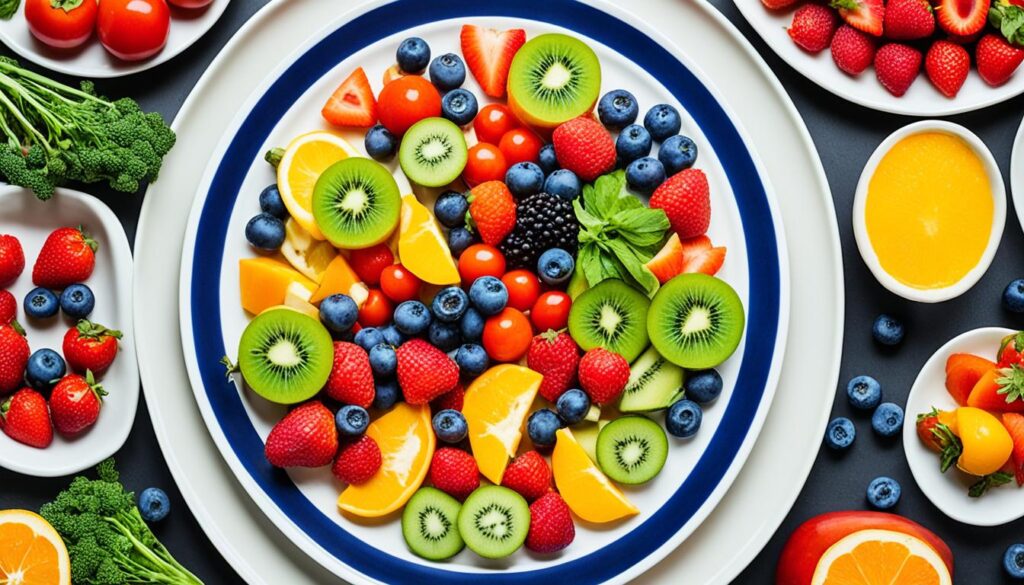
Conclusion
In conclusion, developing a healthy aging nutrition plan for seniors is crucial for their overall well-being. As they age, seniors have unique dietary requirements that need to be addressed to promote vitality and wellness in their later years.
By understanding their specific nutritional needs and implementing strategic meal planning, seniors can ensure they are getting the right balance of nutrients. It is important to incorporate adequate amounts of protein, fiber, vitamins, and minerals into their daily meals.
With the right approach to nutrition, seniors can enjoy a fulfilling and healthy lifestyle for years to come. By embracing a well-balanced diet that meets their individual needs, they can support their physical and mental well-being, maintain a strong immune system, and reduce the risk of age-related diseases.
So let’s prioritize senior nutrition and create meal plans that are not only delicious but also nourishing. It’s never too late to start taking care of our health, and with the right guidance and support, seniors can thrive in their golden years.
FAQ
What are the nutritional needs of seniors?
Seniors have unique nutritional needs due to the aging process. They require adequate amounts of protein, fiber, vitamins, and minerals to support their overall health and well-being. It is also important for seniors to stay hydrated and maintain a well-balanced diet.
How can I create a healthy aging nutrition plan for seniors?
To create a healthy aging nutrition plan for seniors, start by consulting with a healthcare professional or registered dietitian. Consider the specific dietary requirements and medical conditions of the individual. Aim for a well-balanced diet that includes a variety of nutrient-dense foods from all food groups.
What are some tips for meal planning for seniors?
When meal planning for seniors, consider their preferences, dietary restrictions, and any physical limitations they may have. Plan meals that are easy to prepare, nutritious, and enjoyable. Consider incorporating a variety of colors, textures, and flavors to make meals more appealing.
How can I address common challenges in senior nutrition?
Common challenges in senior nutrition include lack of appetite, dental issues, and medication interactions. To address these challenges, consider offering smaller, more frequent meals, choosing softer foods that are easier to chew, and coordinating with healthcare providers to ensure that medications do not interfere with nutrient absorption.
Why is hydration important for healthy aging?
Proper hydration is crucial for seniors’ overall health and well-being. It helps regulate body temperature, maintain proper organ function, support digestion, and prevent dehydration. Seniors should aim to drink an adequate amount of water and hydrating beverages throughout the day.
What is mindful eating, and how can it benefit seniors?
Mindful eating is the practice of paying attention to the present moment while eating, focusing on the sensations, flavors, and satisfaction derived from food. It can benefit seniors by promoting better digestion, portion control, and overall satisfaction with meals. Mindful eating can also help seniors recognize hunger and fullness cues, leading to a healthier relationship with food.

